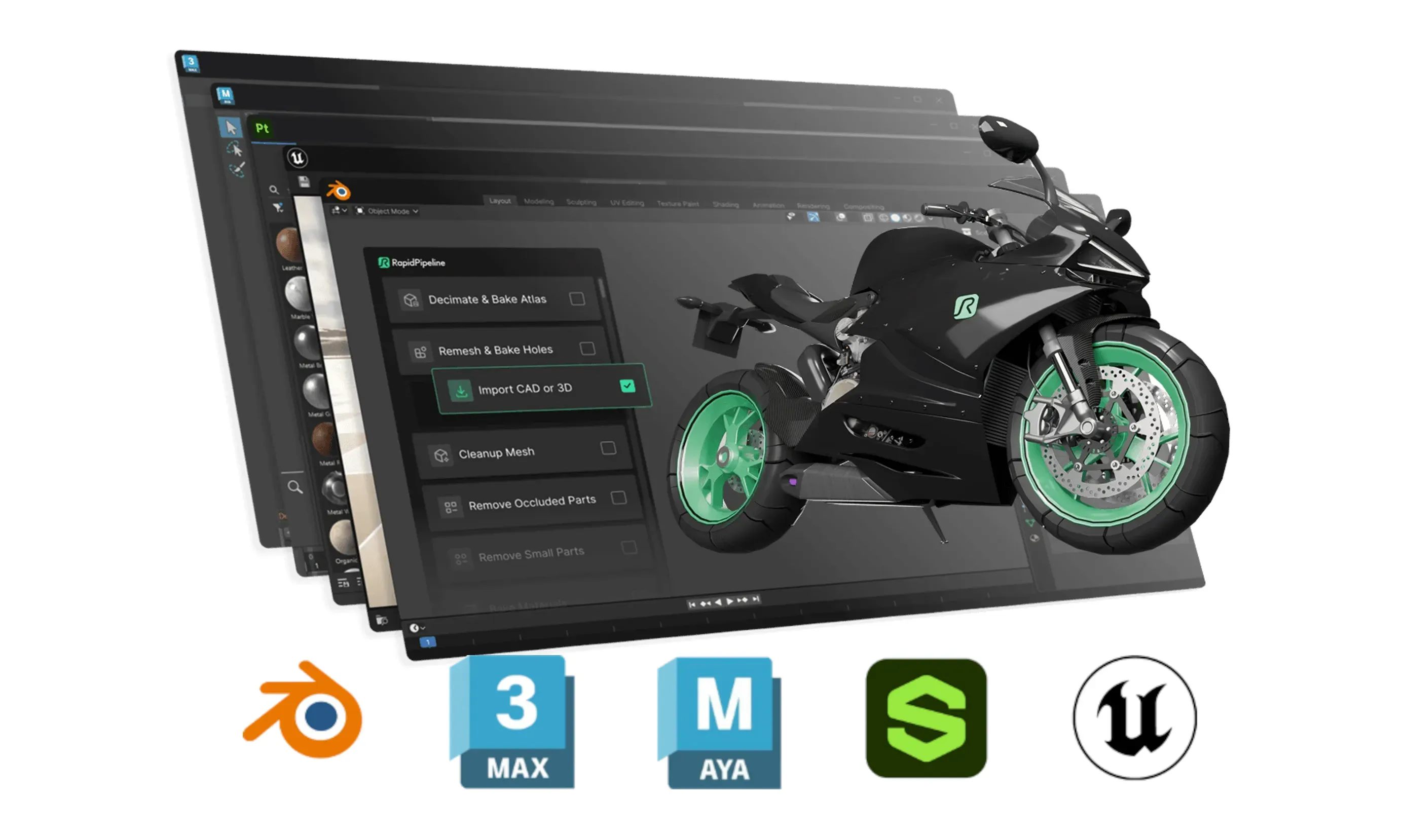The Complete ACIS to IGES Conversion Guide
Table of Contents
- General Information
- Converting and Optimizing ACIS Files to IGES
- What are ACIS and IGES files commonly used for?
- Comparison of Features Supported by ACIS and IGES
- Limitations of ACIS Files to IGES Conversion Workflow
- What's the best way to get ACIS files into my 3D applications, and are there alternatives to using IGES?
General Information
This guide is part of the RapidPipeline 3D Formats Knowledge Database. It shows how to convert ACIS to IGES, if you'd like to know more about the formats, please check out the following links:
Converting and Optimizing ACIS Files to IGES
RapidPipeline can import ACIS files, but currently doesn't support exporting to IGES format yet.
If you specifically need IGES export functionality for your workflow, please feel free to get in touch with us - we'd be happy to discuss your requirements and potential timeline for adding this export capability.
If you need, you can import IGES files and convert them to any of these 8 formats: FBX, glTF, OBJ, PLY, STL, USD, USDZ, and VRM.
In the meantime, you can explore other options on the 3D Formats Knowledge Database, which might serve as suitable alternatives for your workflow depending on your target applications and use cases.

Best-in-Class 3D Processing in Your Favorite Tools.
100% Local Processing via Desktop Software.
Comparison of Features Supported by ACIS and IGES
| Feature | Supported by ACIS | Supported by IGES |
|---|---|---|
| Morph Targets | No | No |
| Rigid Animations | No | No |
| Skinned Animations | No | No |
| Animations | No | No |
| Free-Form Surfaces | Yes | Yes |
| Geometry Compression | No | No |
| Quad Meshes | Yes | Yes |
| Basic 3D Geometry | Yes | Yes |
| PBR Materials | No | No |
| Transparent Materials | No | No |
| Vertex Colors | No | Partial0 |
| Materials | Partial1 | Partial2 |
| Scene Composition | Yes | Partial3 |
| Hierarchical Scene Graph | Yes | Partial4 |
| Scene Nodes | Yes | Yes |
| Standardized Format | Partial5 | Partial6 |
| Embedded Textures | No | No |
| Multiple UV Channels | No | No |
| Normal Mapping | No | No |
| Procedural Textures | No | No |
| Texture Compression | No | No |
| Texture Transforms | No | No |
| Texturing | No | No |
Best-in-Class 3D Processing in Your Favorite Tools.
100% Local Processing via Desktop Software.
Limitations of ACIS Files to IGES Conversion Workflow
The following limitations should be taken into account when converting ACIS files to IGES format:
| ACIS Feature (not supported by IGES) | Limitation Details |
|---|---|
| Hierarchical Scene Graph | Hierarchical Scene Graph Support: ACIS: Full support | IGES: Partial support   IGES Notes: Basic entity relationships and grouping Impact: Scene graphs are one of the most common concepts in 3D computer graphics. By structuring the scene in a hierarchical way, logical parts of it can be easily addressed and transformed. This is useful in many applications, like games or 3D configurators. Without support for this feature, a 3D scene cannot be structured hierarchically, for example objects cannot be logically composed of smaller objects. |
| Scene Composition | Scene Composition Support: ACIS: Full support | IGES: Partial support   IGES Notes: Assembly relationships with limited constraints Impact: Scene Composition describes the process of composing a scene through links from a main scene that pull in various other scenes/3D models. This can also happen in a nested fashion (through multiple levels of linkage). With a target format not supporting this feature, references to external models must be resolved and the content be baked into one 3D model, which is then saved in that target format. |
What's the best way to get ACIS files into my 3D applications, and are there alternatives to using IGES?
Doing 3D conversion right, especially at scale, can be tricky, as 3D data is in general a rather complex (yet very powerful!) medium. This also applies to ACIS and IGES files - the conversion guide above provides a rough first idea about that. Once you know what you would like to do, tools like RapidPipeline can help you perform the necessary steps, and to even automate the process for thousands or even millions of files.
Especially when introducing pipelines and workflows at scale in an enterprise context, it is usually good to rely on dedicated tools and expertise, making sure you do not introduce any steps into your 3D workflow that are detrimental to the final output's quality, or that take your team too much time (and money).
If you're interested to hire dedicated expertise from the best in the field to help your company reach your goals fast and reliably, please do not hestitate to contact DGG. Being the creators of RapidPipeline, and ambassadors for open 3D standards for more than a decade, we have been building some of the world's most advanced 3D pipelines, having processed many millions of 3D assets.
Therefore, our expertise will help you to reach your goals faster, at scale, and with the least possible friction, since we are focused on maximum interoperability.
To get started with 3D data conversion and optimization today, sign up for a free account!
If you have any questions, feel free to chat with our human team.
Best-in-Class 3D Processing in Your Favorite Tools.
100% Local Processing via Desktop Software.
Meet the Author

3D Knowledge Team
3D Technical Artists
RapidPipeline lets you convert, optimize and prepare your 3D models, easily. Try it today, or meet our human 3D experts. The Best-in-Class Tools for Your 3D Processing Jobs